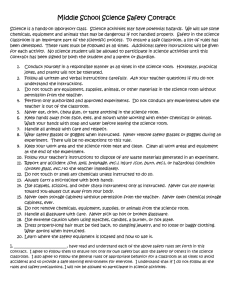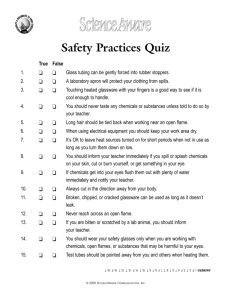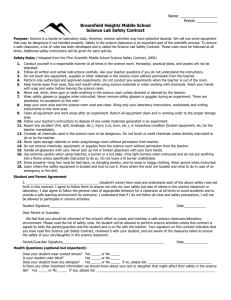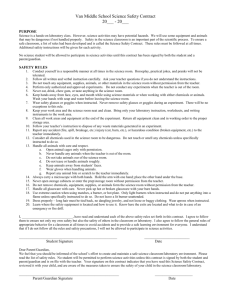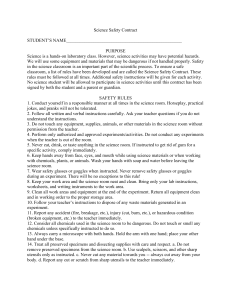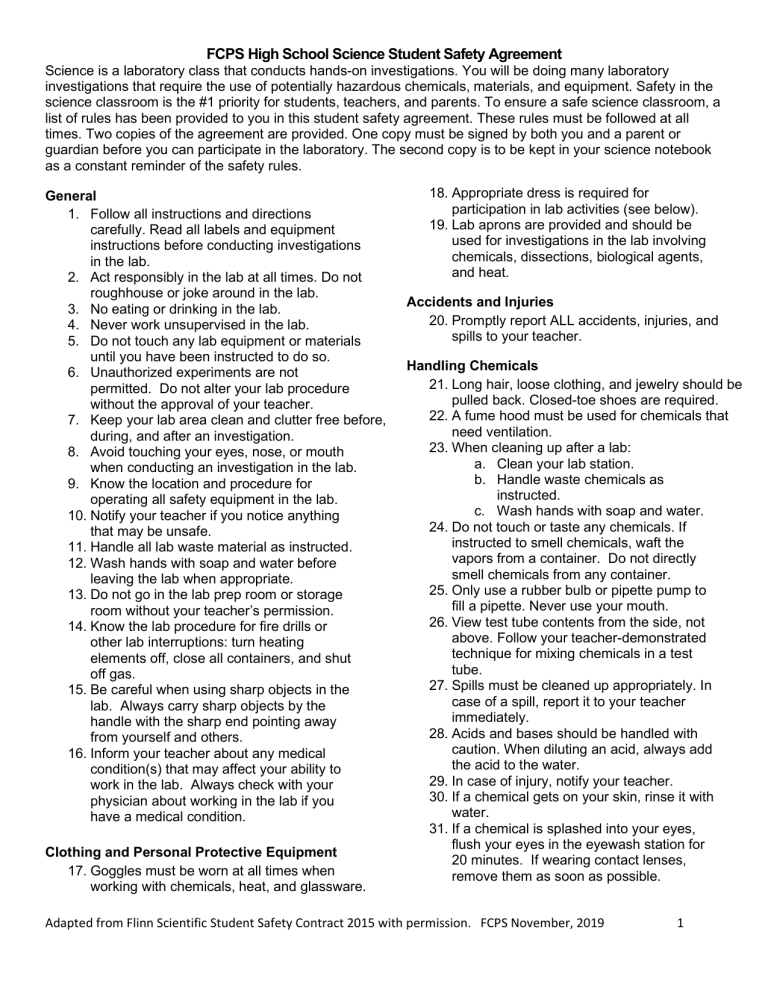
FCPS High School Science Student Safety Agreement Science is a laboratory class that conducts hands-on investigations. You will be doing many laboratory investigations that require the use of potentially hazardous chemicals, materials, and equipment. Safety in the science classroom is the #1 priority for students, teachers, and parents. To ensure a safe science classroom, a list of rules has been provided to you in this student safety agreement. These rules must be followed at all times. Two copies of the agreement are provided. One copy must be signed by both you and a parent or guardian before you can participate in the laboratory. The second copy is to be kept in your science notebook as a constant reminder of the safety rules. General 1. Follow all instructions and directions carefully. Read all labels and equipment instructions before conducting investigations in the lab. 2. Act responsibly in the lab at all times. Do not roughhouse or joke around in the lab. 3. No eating or drinking in the lab. 4. Never work unsupervised in the lab. 5. Do not touch any lab equipment or materials until you have been instructed to do so. 6. Unauthorized experiments are not permitted. Do not alter your lab procedure without the approval of your teacher. 7. Keep your lab area clean and clutter free before, during, and after an investigation. 8. Avoid touching your eyes, nose, or mouth when conducting an investigation in the lab. 9. Know the location and procedure for operating all safety equipment in the lab. 10. Notify your teacher if you notice anything that may be unsafe. 11. Handle all lab waste material as instructed. 12. Wash hands with soap and water before leaving the lab when appropriate. 13. Do not go in the lab prep room or storage room without your teacher’s permission. 14. Know the lab procedure for fire drills or other lab interruptions: turn heating elements off, close all containers, and shut off gas. 15. Be careful when using sharp objects in the lab. Always carry sharp objects by the handle with the sharp end pointing away from yourself and others. 16. Inform your teacher about any medical condition(s) that may affect your ability to work in the lab. Always check with your physician about working in the lab if you have a medical condition. Clothing and Personal Protective Equipment 17. Goggles must be worn at all times when working with chemicals, heat, and glassware. 18. Appropriate dress is required for participation in lab activities (see below). 19. Lab aprons are provided and should be used for investigations in the lab involving chemicals, dissections, biological agents, and heat. Accidents and Injuries 20. Promptly report ALL accidents, injuries, and spills to your teacher. Handling Chemicals 21. Long hair, loose clothing, and jewelry should be pulled back. Closed-toe shoes are required. 22. A fume hood must be used for chemicals that need ventilation. 23. When cleaning up after a lab: a. Clean your lab station. b. Handle waste chemicals as instructed. c. Wash hands with soap and water. 24. Do not touch or taste any chemicals. If instructed to smell chemicals, waft the vapors from a container. Do not directly smell chemicals from any container. 25. Only use a rubber bulb or pipette pump to fill a pipette. Never use your mouth. 26. View test tube contents from the side, not above. Follow your teacher-demonstrated technique for mixing chemicals in a test tube. 27. Spills must be cleaned up appropriately. In case of a spill, report it to your teacher immediately. 28. Acids and bases should be handled with caution. When diluting an acid, always add the acid to the water. 29. In case of injury, notify your teacher. 30. If a chemical gets on your skin, rinse it with water. 31. If a chemical is splashed into your eyes, flush your eyes in the eyewash station for 20 minutes. If wearing contact lenses, remove them as soon as possible. Adapted from Flinn Scientific Student Safety Contract 2015 with permission. FCPS November, 2019 1 Handling Glassware 32. Always check glassware for cracks or chips before use. Never use damaged glassware. 33. Report any broken or cracked glassware to your teacher. Broken glass should be disposed of as instructed. Heating and Using an Open Flame 34. Long hair, loose clothing, and jewelry should be pulled back before using heat or open flames. 35. Never leave an open flame or anything being heated unattended. 36. Stay focused and attentive at all times when using an open flame. Never reach over an open flame. 37. When heating a test tube, use a test tube clamp and always point the open end of the test tube away from yourself and others. 38. Do not heat flammable liquids with an open flame. Never dispense flammable liquids anywhere near an open flame or heat source. 39. Glassware and metal stay hot long after heating and look the same as cool equipment. Set them aside to cool on an insulated surface before handling. 40. When using a hot plate, do not touch the heating surface. 41. Unplug the hot plate when finished and set aside to cool. 42. In case of injury from heat, notify your teacher. a. Cool burns by placing the affected area under cold water. Handling Electrical and Other Equipment 43. Always use the plug - not the cord - to remove an electrical plug from the socket. Be sure that your hands are dry when touching an electrical switch, plug or wall socket. 44. Visually inspect equipment before plugging it into a wall socket. Never use equipment with frayed wires, exposed wires, or loose connections. 45. Report damaged equipment immediately to your teacher. 46. Discharge electrostatic equipment only as instructed. 47. Beware of sharp edges on all lab equipment and use care in working with these objects. 48. Handle heavy objects carefully at all times. 49. Never look directly into a laser or point a laser at a person. Handling Biological Material 50. Slide and petri dish preparation require the use of goggles. Goggles may be temporarily removed when viewing specimens through microscopes, but should be worn at all other times when working with biological agents. 51. Gloves are required to be worn when using preserved specimens. 52. Clean all work surfaces and wash your hands with soap and water after performing experiments involving preserved or live specimens or bacteria. 53. All biological materials should be disposed of as instructed. Student Agreement: I agree to follow all of the safety rules of this agreement. I realize that I am responsible for following these rules to ensure my own safety and the safety of others. I will work with my teacher and classmates to maintain a safe lab environment. I will follow the oral and written instructions provided by my teacher. I am aware that any violation of this safety agreement that results in unsafe lab conditions may result in disciplinary action taken in accordance with the SR&R. Printed Student Name:________________________________________ Student Signature: ____________________________________ Date: ______________________________________ Parent/Guardian Agreement: I have read the safety rules of this agreement and I am aware of measures taken to provide a safe lab environment for my child. I will direct my child to uphold this agreement and follow these rules in the lab. Printed Parent/ Guardian Name:________________________________ Parent/ Guardian Signature: ____________________________ Date: ___________________________________________ Adapted from Flinn Scientific Student Safety Contract 2015 with permission. FCPS November, 2019 2
